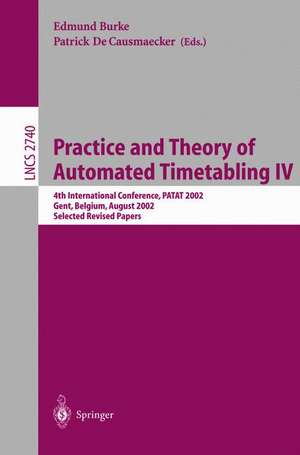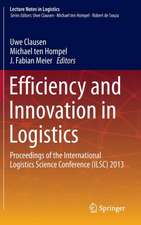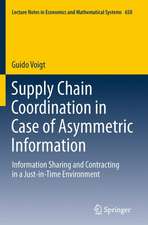Practice and Theory of Automated Timetabling IV: 4th International Conference, PATAT 2002, Gent, Belgium, August 21-23, 2002, Selected Revised Papers: Lecture Notes in Computer Science, cartea 2740
Editat de Edmund Burke, Patrick De Causmaeckeren Limba Engleză Paperback – 21 aug 2003
Din seria Lecture Notes in Computer Science
- 20%
 Preț: 1061.55 lei
Preț: 1061.55 lei - 20%
 Preț: 307.71 lei
Preț: 307.71 lei - 20%
 Preț: 438.69 lei
Preț: 438.69 lei - 20%
 Preț: 645.28 lei
Preț: 645.28 lei -
 Preț: 410.88 lei
Preț: 410.88 lei - 15%
 Preț: 580.46 lei
Preț: 580.46 lei - 17%
 Preț: 427.22 lei
Preț: 427.22 lei - 20%
 Preț: 596.46 lei
Preț: 596.46 lei -
 Preț: 449.57 lei
Preț: 449.57 lei - 20%
 Preț: 353.50 lei
Preț: 353.50 lei - 20%
 Preț: 1414.79 lei
Preț: 1414.79 lei - 20%
 Preț: 309.90 lei
Preț: 309.90 lei - 20%
 Preț: 583.40 lei
Preț: 583.40 lei - 20%
 Preț: 1075.26 lei
Preț: 1075.26 lei - 20%
 Preț: 310.26 lei
Preț: 310.26 lei - 20%
 Preț: 655.02 lei
Preț: 655.02 lei - 20%
 Preț: 580.93 lei
Preț: 580.93 lei - 20%
 Preț: 340.32 lei
Preț: 340.32 lei - 18%
 Preț: 938.83 lei
Preț: 938.83 lei - 20%
 Preț: 591.51 lei
Preț: 591.51 lei - 15%
 Preț: 438.59 lei
Preț: 438.59 lei - 20%
 Preț: 337.00 lei
Preț: 337.00 lei -
 Preț: 389.48 lei
Preț: 389.48 lei - 20%
 Preț: 607.39 lei
Preț: 607.39 lei - 20%
 Preț: 1024.44 lei
Preț: 1024.44 lei - 20%
 Preț: 579.30 lei
Preț: 579.30 lei - 20%
 Preț: 763.23 lei
Preț: 763.23 lei - 20%
 Preț: 453.32 lei
Preț: 453.32 lei - 20%
 Preț: 575.48 lei
Preț: 575.48 lei - 20%
 Preț: 585.88 lei
Preț: 585.88 lei - 20%
 Preț: 825.93 lei
Preț: 825.93 lei - 20%
 Preț: 763.23 lei
Preț: 763.23 lei - 17%
 Preț: 360.19 lei
Preț: 360.19 lei - 20%
 Preț: 1183.14 lei
Preț: 1183.14 lei - 20%
 Preț: 340.32 lei
Preț: 340.32 lei - 20%
 Preț: 504.57 lei
Preț: 504.57 lei - 20%
 Preț: 369.12 lei
Preț: 369.12 lei - 20%
 Preț: 583.40 lei
Preț: 583.40 lei - 20%
 Preț: 343.62 lei
Preț: 343.62 lei - 20%
 Preț: 350.21 lei
Preț: 350.21 lei - 20%
 Preț: 764.89 lei
Preț: 764.89 lei - 20%
 Preț: 583.40 lei
Preț: 583.40 lei - 20%
 Preț: 649.49 lei
Preț: 649.49 lei - 20%
 Preț: 341.95 lei
Preț: 341.95 lei - 20%
 Preț: 238.01 lei
Preț: 238.01 lei - 20%
 Preț: 538.29 lei
Preț: 538.29 lei
Preț: 336.54 lei
Preț vechi: 420.67 lei
-20% Nou
Puncte Express: 505
Preț estimativ în valută:
64.40€ • 67.37$ • 53.49£
64.40€ • 67.37$ • 53.49£
Carte tipărită la comandă
Livrare economică 03-17 aprilie
Preluare comenzi: 021 569.72.76
Specificații
ISBN-13: 9783540406990
ISBN-10: 3540406999
Pagini: 380
Ilustrații: XII, 368 p.
Dimensiuni: 155 x 235 x 20 mm
Greutate: 0.53 kg
Ediția:2003
Editura: Springer Berlin, Heidelberg
Colecția Springer
Seria Lecture Notes in Computer Science
Locul publicării:Berlin, Heidelberg, Germany
ISBN-10: 3540406999
Pagini: 380
Ilustrații: XII, 368 p.
Dimensiuni: 155 x 235 x 20 mm
Greutate: 0.53 kg
Ediția:2003
Editura: Springer Berlin, Heidelberg
Colecția Springer
Seria Lecture Notes in Computer Science
Locul publicării:Berlin, Heidelberg, Germany
Public țintă
ResearchCuprins
General Issues.- Constraints of Availability in Timetabling and Scheduling.- A Standard Framework for Timetabling Problems.- Solving Dynamic Resource Constraint Project Scheduling Problems Using New Constraint Programming Tools.- Sports Timetabling.- Integer and Constraint Programming Approaches for Round-Robin Tournament Scheduling.- Characterizing Feasible Pattern Sets with a Minimum Number of Breaks.- Solving the Travelling Tournament Problem: A Combined Integer Programming and Constraint Programming Approach.- Employee Timetabling.- Personnel Scheduling in Laboratories.- Scheduling Doctors for Clinical Training Unit Rounds Using Tabu Optimization.- Relaxation of Coverage Constraints in Hospital Personnel Rostering.- Storing and Adapting Repair Experiences in Employee Rostering.- Scheduling Agents – Distributed Timetabling Problems.- Examination Timetabling.- A Multiobjective Optimisation Technique for Exam Timetabling Based on Trajectories.- Enhancing Timetable Solutions with Local Search Methods.- A Hybrid Algorithm for the Examination Timetabling Problem.- GRASPing the Examination Scheduling Problem.- University Course and School Timetabling.- Search Strategy for Constraint-Based Class–Teacher Timetabling.- Multi-neighbourhood Local Search with Application to Course Timetabling.- Knowledge Discovery in a Hyper-heuristic for Course Timetabling Using Case-Based Reasoning.- Generalizing Bipartite Edge Colouring to Solve Real Instances of the Timetabling Problem.- Flow Formulations for the Student Scheduling Problem.- University Course Timetabling with Soft Constraints.- A Comparison of the Performance of Different Metaheuristics on the Timetabling Problem.












